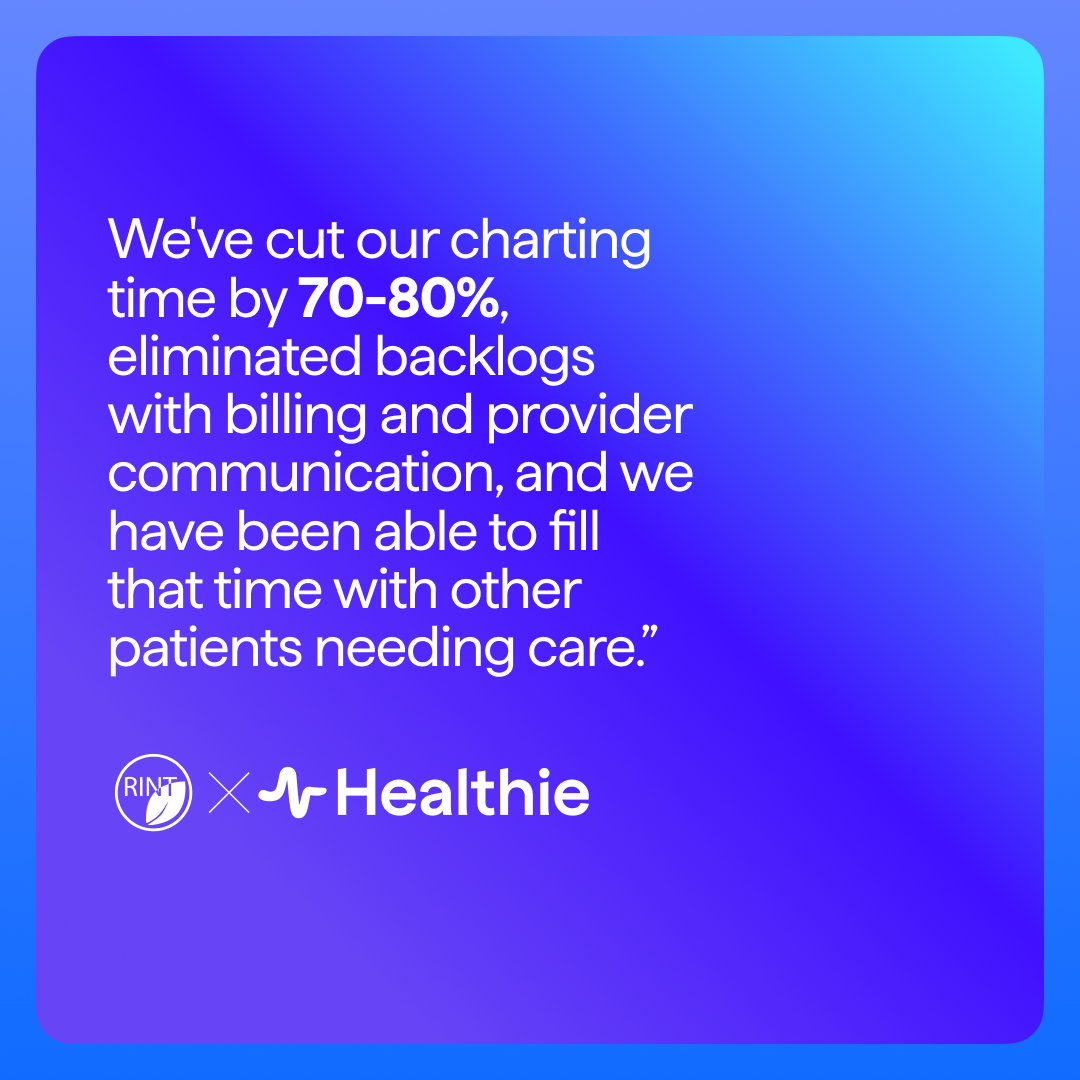

Incident to billing rules & guidelines
Learn about incident to billing rules and guidelines at Healthie. Read about how incident to billing is used for nutrition services.
For nutrition professionals, helping clients use their insurance benefits allows them to receive quality nutritional care at a more affordable price. However, becoming directly credentialed with insurance panels, and managing insurance billing, is no light task. As an alternative to self-credentialing, many nutrition professionals choose to partner with Medicare-credentialed physicians and use “incident to” billing for reimbursement. Whether your practice is large and well established, or a digital health startup, Healthie’s EHR platform can help you navigate this process. To set up a free Starter Account, click here.
Incident to billing is a way of billing outpatient services, such as nutrition services that are provided by a non-physician practitioner. In general, non-physician providers (NPP) can include physician assistants, nurse practitioners, and other wellness providers such as dietitians. In short, incident to billing will allow a dietitian to provide nutrition counseling services, billed by the physician, for which the dietitian can then be reimbursed for.
This article clarifies “incident to” services billed by physicians and non-physician providers, such as dietitians. We cover FAQs for incident to billing, pros and cons of this type of billing, and billing requirements as set by Medicare, to help both physicians and dietitians understand how to properly bill incident to services.
Frequently asked questions for incident to billing
What does “incident to” billing mean?
“Incident to” services are defined by Medicare as “those services that are furnished incident to physician professional services in the physician’s office (whether located in a separate office suite or within an institution) or in a patient’s home.” This type of billing allows non-physician providers to report services “as if” they were performed by a physician.
How can incident to billing be used for nutrition services?
In order to bill incident to, the patient must already be an established patient of the physician, and the non-physician provider (ie. dietitian) then works with the patient towards the documented medical condition/diagnosis. To qualify for incident to billing, the services must be part of the patient’s normal course of treatment, during which a physician personally performed an initial service and remains actively involved in the course of treatment. The physician does not have to be physically present in the patient’s treatment room while the nutrition services are provided, but the physician must be present in the office suite to provide assistance if needed.
If the patient’s diagnosis changes, or there are other conditions that the non-physician providers want to address, the patient most likely should revisit the physician first to address their plan of care. The necessity of the incident to services should be documented in the patient’s record.
Although there is no “set” frequency of follow-up sessions, it essentially means that a physician cannot see the patient once and then have non-physician practitioners fully manage the patient’s ongoing care.
Do all insurance payers recognize incident to billing?
No. Incident to billing was created under Medicare and not all other private insurance payers have adopted these guidelines. For the insurance payers that the physician is in-network with, it’s best to contact them directly, review contracts, and clarify if incident to billing is accepted.
Who does the billing? The non-physician provider, or the physician?
Depending on the agreement established with the physician, incident to billing can be billed by either the physician (under the physician’s PIN number) OR by the non-physician provider (under their NPI number). There is a variance in the reimbursement amount.
Reimbursement for Incident to billing by physician: 100% of Medicare Physician Fee Schedule (MPFS)
Reimbursement for incident to billing by non-physician provider: 85% of Medicare Physician Fee Schedule (MPFS)
{{pp-newsletter-signup}}
Does the dietitian (or NPP) need to also be credentialed with Medicare?
According to CMS guidelines, the physician may bill under the “incident to” provision for services provided by employees whose services cannot be paid for directly under the Medicare program (ie. the dietitian is not credentialed with Medicare). Employees of the physician may provide services incident to the physician’s service, but the physician alone is permitted to bill Medicare. Services provided by employees as “incident to” are covered when they meet all the requirements for incident to and are medically necessary for the individual needs of the patient. If all of this is still confusing, look to Healthie’s free starter plan to help streamline billing processes.
Who can bill for incident to services?
In the office/clinic setting when the physician performs the evaluation and management (E/M) service, the service must be reported using the physician’s UPIN/PIN. When an E/M service is a shared/split encounter between a physician and a non-physician practitioner, the service is considered to have been performed “incident to” if the requirements for “incident to” are met and the patient is an established patient.
That being said, if the dietitian or NPP is credentialed with Medicare, and the nutrition services provided do not meet the requirements for incident to billing, the service must be billed under the NPP’s UPIN/PIN. The payment will be made at the appropriate fee schedule payment.
Beyond medicare, dietitians that do not have contracts with private insurance plans can be employed by physicians who would like to bill private insurance companies for nutrition services. In these cases, the physicians should review their contracts with the insurance payers for incident to billing.
In many cases, physicians may not know the precise regulations and mandatory steps to carry out their billing correctly. According to the American Medical Association, “physicians should, with respect to commercial insurer regulations, keep in mind that each commercial insurer has its own policy for billing for non-physician practitioners’ services. Some require the non-physician practitioner’s services to be billed using the non-physician provider’s number, while other commercial insurers require the non-physician practitioner services to be billed under the physician’s provider number. As billing incident to insurance incorrectly can lead to denied claims, liability, or fines, if a physician is unsure how to bill, he or she should call the insurer’s provider relations director.
Failure to properly bill incident to services can result in fines and penalties. The best protection against this liability is to review billing practices, ensure that your practice has clear and compliant guidelines, verify and review your compliance measures, and use third party professionals to audit both.
What are the Medicare requirements for billing incident to services?
There are certain rules and regulations that must be followed for you to bill your nutrition services as incident to:
- Must take place in a “noninstitutional setting.” This is defined as all settings other than a hospital or skilled nursing facility.
- A Medicare-credentialed physician must initiate the patient’s care. Incident to services cannot be rendered on the patient’s first visit, or if a change to the plan of care occurs. If the patient has a new or worsened complaint, a physician must conduct an initial evaluation and management (E/M) service for that complaint, and must establish the diagnosis and plan of care.
- Services provided at an expense to the physician. Incident to services must be provided by a caregiver whom the physician directly supervises, and who represents a direct financial expense to the physician (such as a “W-2” or leased employee, or an independent contractor).
- Direct supervision is provided (or available). This does not mean the physician has to be physically in the same room as the patient, but it does mean that they have to be in a nearby room of the office suite or facility to offer immediate assistance when necessary.
- Part of the patient’s plan of care. The provided incident to services (ie. nutrition counseling) must be an integral part of the patient’s treatment course
What are the benefits for providing nutrition services incident to a physician?
Time saved.
For nutrition professionals, seeing patients in an outpatient or private practice setting can be a great way to build a business, and make additional income. However, the time that it takes to credential with insurance companies and self-manage billing, may not be worth the investment for every nutrition provider. Often times another job or family responsibilities can detract from the time available to dedicate to insurance billing. In these cases, it could be more ideal to work in conjunction with a physician to see clients within their office. Not only will this partnership generally lead to a steady amount of client referrals, but it takes the onus of insurance billing off the nutrition professional. As physicians generally have a biller or office administrator to manage billing, the additional insurance claims for nutrition services can be easily managed within their existing biller system.
Higher reimbursement.
In addition, for billing incident to for nutrition services via a physician, there is typically higher reimbursement for claims as physician reimbursements exceed non-physician reimbursements. Typically physicians will receive 100% of Medicare Physician Fee Schedule (MPFS) for services provided by NPP but billed by a physician. Receive 85% of MPFS if billed by the non-physician provider.
Are there any disadvantages to billing incident to for nutrition services?
Despite the advantages of incident to billing, there can also be some drawbacks. Dietitians interested in pursuing incident to billing should review this list closely, to determine if it will best meet their needs.
Strict requirements.
There are many requirements that must be satisfied before billing eligibility for these services. Some common violations to incident to billing include:
- Billing “incident to” for new patients (not assessed by the physician yet)
- Billing “incident to” for established patients with new problems
- Billing under NPI of treating physician rather than supervising physician
- Not satisfying supervision requirements
- Violating State law requirements
- Treating physician in solo practice not in office suite during service
- No supervising physician in group practice in office suite during service – Need of “direct supervision”
Potential liability.
Unfortunately, failure to meet all incident to billing requirements can result in penalties and fines. Improper billing may result in False Claims Act (FCA) liability pursued by the Department of Justice.
Which codes should be used for nutrition services provided?
Healthcare Common Procedure Coding System is a collection of insurance billing codes that represent procedures, supplies, products and services which may be provided to Medicare beneficiaries and to individuals enrolled in private health insurance programs.
HCPCS codes are used for billing Medicare and Medicaid patients:
- G0447 – behavioral counseling for obesity, individual, face-to-face behavioral counseling for patients with a BMI ≥ 30, who are alert and able to participate in counseling.
Current Procedural Terminology (CPT) codes are the codes that identify the service you provided as a healthcare professional. The three most common medical nutrition therapy (MNT) codes that dietitians use on claims are listed below. Public insurers, like Medicare and Medicaid, as well as private insurance carriers, can use these CPT codes.
- 97802 – For an initial assessment, face-to-face
- 97803 – For a follow-up visit or reassessment, face-to-face
- 97804 – For a group visit (2 or more individuals)
Incident to billing and Healthie
For physicians and non-physician providers, like nutritionists and dietitians, using Healthie for insurance billing, incident to billing can easily be managed through Healthie’s EHR platform. With our free starter plan, you can get all these benefits for $0. Depending on which provider is submitting the claim (MD or NPP), the correct NPI/PIN number needs to be listed.
When filling out a CMS 1500 form within Healthie, you will also have to specify the number of units and your fee per unit. Insurance billing is in units of 15 minutes each (ie. a 1-hour initial assessment is 4 units). Make sure you are using the correct codes. If the claim doesn’t meet all the incident to standards, bill only for that portion of the service that has been completely documented and could stand alone if submitted by either the physician or nonphysician provider. The result might be that you get reimbursed for lower than you were meant to be or that you get reimbursed at 85 percent of the fee schedule rather than 100 percent.




